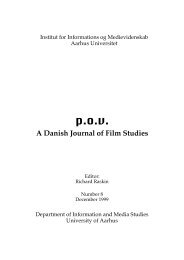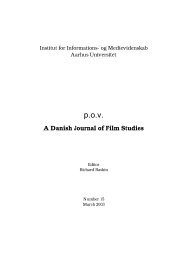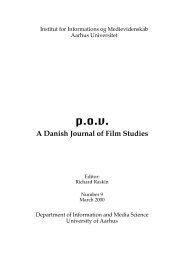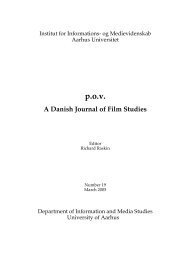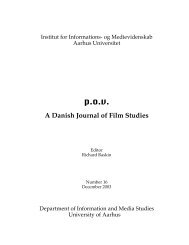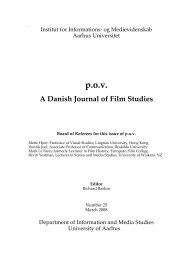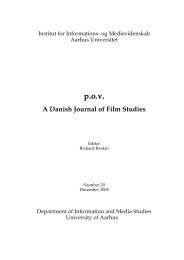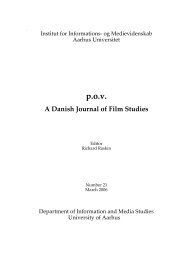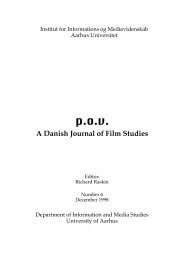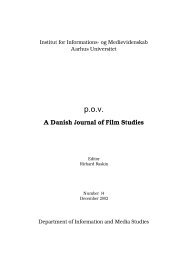The Face of Time - POV - Aarhus Universitet
The Face of Time - POV - Aarhus Universitet
The Face of Time - POV - Aarhus Universitet
Create successful ePaper yourself
Turn your PDF publications into a flip-book with our unique Google optimized e-Paper software.
A Danish Journal <strong>of</strong> Film Studies 81<br />
the 70s. Most directly this can be seen in From a Night Porter’s Point<br />
<strong>of</strong> View, where the main character embodies the controlling, bureaucratic<br />
mentality <strong>of</strong> the system. What seems to be a neutral and even<br />
empathetic portrait at the beginning <strong>of</strong> the film gradually becomes<br />
the revelation <strong>of</strong> a more and more fanatic and cruel control freak.<br />
<strong>The</strong> concrete observational documentation <strong>of</strong> this porter who not<br />
only performs his control at work, but also expands his wish to<br />
control and suppress to all aspects <strong>of</strong> private life and leisure time,<br />
therefore becomes a symbol for a whole society and its ruling class.<br />
<strong>The</strong> lack <strong>of</strong> distance and explicit critique makes the film’s message<br />
even stronger and more shocking because the filmic identification<br />
process is used to create distance and dislike.<br />
It is the same mechanism that gives us a really scary lesson in<br />
Curriculum Vitae, in which it is gradually revealed how far a real<br />
party committee is willing to go in its personal persecution <strong>of</strong> a<br />
fictionally constructed life story and person. What the film actually<br />
demonstrates is that the whole thing, also in the actual historical<br />
trials against people who did not submit completely to the system,<br />
was a more or less fictional construct.<br />
A very strong documentary film from 1980 is Station (Dworzec);<br />
again, on one level this is a very lyrical and poetical observation <strong>of</strong><br />
people coming and going at the central Station in Warsaw, people<br />
interested in ordinary things and each other, but at the same time it<br />
is a film demonstrating the ‘big brother’ tendencies <strong>of</strong> Polish society<br />
just nine years before the fall <strong>of</strong> communism in Eastern Europe. <strong>The</strong><br />
film jumps between a big television screen in the waiting hall where<br />
the system addresses the people with obvious propaganda and<br />
constructed news, the surveillance cameras at the station, and<br />
everyday life. Just as in <strong>The</strong> Office, the observation <strong>of</strong> reality is



